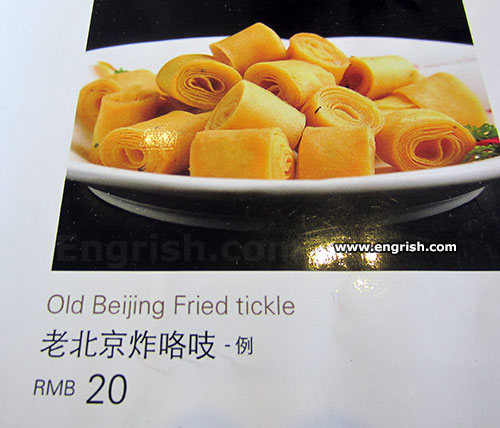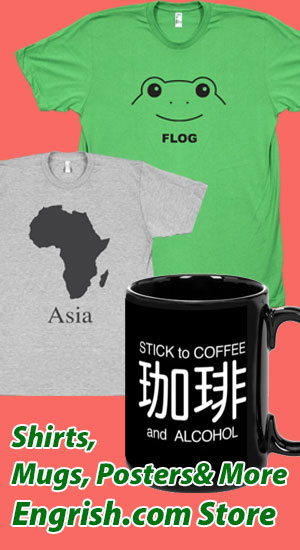Engrish.com
Documenting the Engrish phenomenon from East Asia and around the world!
Documenting the Engrish phenomenon from East Asia and around the world!
Engrish for Humor Times...
The fever doesn’t show until 14 days later.
Home | Brog | Store | Massage Board | Advertise | Contact Us | Disclaimer
© 1999 - 2025 Engrish.com. All rights reserved.
© 1999 - 2025 Engrish.com. All rights reserved.




 (73 votes, average: 3.64 out of 5)
(73 votes, average: 3.64 out of 5)

Oh Corona
They’re out of Old Wuhan
The first time this was cooked must have been a test tickle.
Finger food – very gently.
Warning! After eating this dish, you may turn pink.
@engrishwebmaster: By then, sufferers are two week to get out of bed.
Could be worse.
It could be; Fried Tackle.
One little tickle for your stomach, then the real tickle when you go for a trickle.
@Marum: From the look of it, this could be rolled strips of foreskin. The foreskin of what, is anybody’s guess!
Where are our learned linguists? I was hoping someone would post a translation of the Chinese version.
@Droll not Troll | 10:14 pm |
Believe me . . . the funny Chinese term (咯吱) does not mean anything to me (even as a native Chinese user from Hongkong) at all apart from sounding like ‘ku-chi.’
I am absolutely clueless as to what this ‘deep-fried ku-chi’ actually is.
The Kuchi or Afghan.The Pakistan Pashtun call them “Ghiljak” or “Kucchi”Shepherd is an Afghan livestock guardian dog, taking its name from the Kuchi people of Pakistan and Afghanistan. It is a working dog following the nomads, protecting caravans and flocks of sheep, goats, camels and other livestock from wolves, big cats and thieves.
Stollen from Wonkypedia.
I am much happier now, it is merely fried dogs tackle.
@Peter Chan: Ku-chi is a possible clue. Someone might say “Coochy-coo” when tickling a baby. Although, how this translation could come from there… 😕
Pleco dictionary translates 咯吱 as “creak, groan”.
Chinese Wikipedia has no article on this dish, but Baidu Baike has one: https://baike.baidu.com/item/%E7%82%B8%E5%92%AF%E5%90%B1
Google refused to translate the name of the dish, saying simply “Fried”.
Ref. Peter Chan’s translation: Anyone heard of Ku Ichi soba? I’ve seen references to it, but can’t find any info. Maybe that’s what this is.
BTW, I know that soba is a buckwheat noodle, just have never heard of Ku Ichi before.
@Droll not Troll | 4:38 am |
‘Ku ichi’ is unmistakably Japanese that could mean ‘九一’ (literally 91), and ‘soba’ is the Japanese term for ‘buckwheat noodles.’
‘Ku Ichi’ is more likely merged into ‘kuichi’. meaning 91.
So ‘Ku ichi soba’ could well mean ’91 Soba Restaurant’ . . . 91 being the name of the soba restaurant. Japanese people often name their shops/restaurants with numbers.